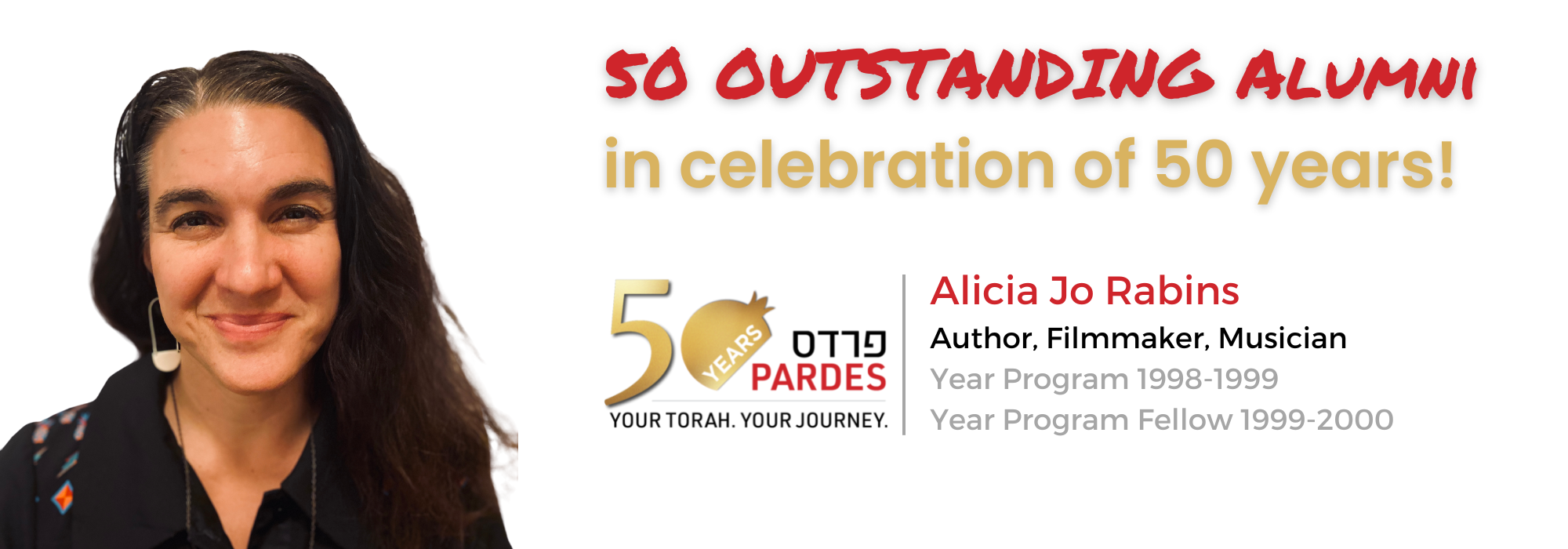
They are leading and creating organizations and businesses of all kinds, responding to humanitarian crises, writing novels, educating at all levels, creating works of art, and so much more! In celebration of Pardes’s 50th, we are highlighting 50 standout alumni whose accomplishments exemplify the rich texture of the Pardes community worldwide.
Alicia Jo Rabins is a writer, musician, performer and Torah teacher whose work examines the intersection of ancient Jewish texts and contemporary life through a lens of beauty, feminism and experimentation.
Most recently, Alicia is the creator and star of the independent feature film A Kaddish for Bernie Madoff; a book of short essays about early parenthood and Jewish spirituality, “Even God Had Bad Parenting Days,” published by Behrman House; and Girls in Trouble, an indie-folk song cycle about the complicated lives of Biblical women. Alicia also teaches Torah to kids, teens and adults, specializing in feminist Jewish education as well as b’nai mitzvah preparation and officiation for unaffiliated families.
WHAT DID YOU DO FOR THE FIRST TIME AT PARDES?
About a million things! Pardes was my first time in an observant space, so it was my first time observing Shabbat, learning to read Hebrew (then Aramaic), studying Talmud, learning to daven, eventually learning to lead tefilla as well, learning sofrut…just so many things!
CAN YOU SHARE A SPECIAL PARDES MEMORY?
I remember receiving my Hebrew name during women’s tefilla one morning and dancing around with fellow students, as well as teachers, to celebrate! I felt so touched that people would celebrate this moment with me.
WHAT ARE YOU MOST PROUD OF IN YOUR WORK?
I’m proud of bringing Jewish texts into art, with a lens of vulnerability and sensitivity, which is challenging in daily life, and combining these to (I hope) create pleasure, beauty, and catharsis for those who are looking for this experience. I’m also proud of my teaching, especially my b’nai mitzvah work with unaffiliated families, who often have complicated or negligible relationships with Judaism – it is a deep privilege to help them find an authentic way into the b’nai mitzvah ceremony, to hold space for that ceremony and hopefully through that process to create a personal connection between them and their tradition. And I’m proud to be part of the great midrashic process, combining Jewish text, ritual, and art, and weaving all three together – especially through a feminist lens.
WHAT WAS YOUR FAVORITE CLASS AT PARDES?
Oh gosh, I can’t choose!! Truly. But I’ll always be grateful to Meir for his patience with me as an absolute beginner in Mishna class; to Judy for taking a chance on me and letting me join her class – even though I was fairly early in my journey; and to Levi Cooper for listening to me when I said “I wish we had a Night Seder” and starting to stay late so that we could!
I also loved Avivah Zornberg’s shiurim; I’d come straight to Pardes from Barnard, where I studied English and creative writing, so it was wonderful to get to experience a direct analysis of Jewish texts through a literary lens.
HOW DOES PARDES CONTINUE TO AFFECT YOU TODAY?
I draw on what I learned at Pardes every single day, and every day I am grateful for the generosity, wisdom and kindness of my teachers there (and my fellow students as well.) I entered Pardes with very little Jewish knowledge – the alphabet, some basic holiday observance, and what I learned for my bat mitzvah – and left after two years with an absolute wealth of knowledge, and the tools to continue that for the rest of my life. I draw on what I learned there (and what Pardes empowered me to learn as I’ve continued my education) in my poetry and prose; my music, theater and film work; and of course, in my role as an independent Jewish educator and lecturer. I arrived as a feminist and a deep believer in progressive values and individual choice, and I am so grateful that at Pardes, I never felt I had to choose between these values and learning how to learn Torah.